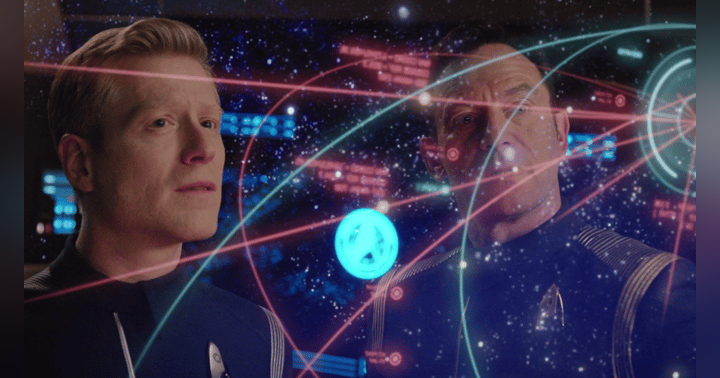I’m going to be honest. Today’s episode is...well...well, it's terrible. The Alternative Factor, Season 1, Episode 20 of the original Star Trek series is ranked among the worst of all Star Trek episodes by several sites and publications and I have to agree. But we won’t let that stop us from learning and growing in leadership skills will we?! No way. If nothing else, this episode shows us that we have the opportunity to glean a leadership lesson from anything. Despite its poor cinematic qualities, there are a few gems we can unearth.
Oftentimes, when we think of leadership we think in the extreme. We envision moments of great importance or intensity. Those times when your team is in crisis or when you’re on the brink of unlocking an employee’s potential. But the reality is, most of leadership is just showing up. This episode opens with the crew on a boring, routine day on the Enterprise. But Captain Kirk is there, right along with them in the everyday mundane. Woody Allen said, “80 percent of success is showing up,” and leadership is not an exception. I remember one of my first upper-management jobs. I had worked as a line supervisor for years and finally had a position where the supervisors reported to me. This is the good stuff, right? One day, I finished an email and realized I didn’t have any other work to do. There wasn’t a long to-do list waiting for me or anything pressing for the rest of the day. I swung by my boss’s desk and let him know. His response was interesting and reflected what we see in this episode with Kirk. He said, “Sometimes leadership is just being there.”
The lesson here is that leadership has a job attached to it. I have days where I work on a budget presentation or review audit reports. I can only imagine the work you do every day in your job. But for all of us, we have the grind. Even Captain Kirk! Sometimes you’re completing your tasks, sometimes you’re completing tasks and leading, and sometimes you’re just leading. The grind is an opportunity to do the foundational work of good leadership. The only other crew member we see anything out of in this episode is Spock. What we see is the benefits of training, development, and trust-building between him and Kirk. Kirk creates a culture where his team is well prepared for the unexpected, even in the most routine of circumstances. If boring and routine were the norms, we wouldn’t need people in leadership positions. We need leaders because the routine is shaken up all the time. We need to develop people to be able to respond to the unexpected. We need to develop strategic plans so we aren’t lost when things go south. Running through a playbook or a drill helps prepare your team for those moments that fall out of the routine. Like when your spaceship experiences two huge impacts and your crew must respond. Boring, daily routine, and then the galaxy is under threat of immediate invasion. At no point does anyone lose their cool. In fact, everyone performs at a high level. Lt. Masters identifies problems with the dilithium crystals, offers a solution, and executes it. Spock researches the problem and looks for solutions. Everyone steps up because Kirk, and this is an assumption on my part, regularly drills and prepares his crew for the unexpected. He has a talented crew and trusts his department heads to handle the technical aspects of their job. He helps elevate them to top performers in all situations. Don’t waste the gift of ordinary days as a leader. Because you never know when intensity will come, giving you the chance to reap the reward of the investments you made.
Now that chaos has returned to the Enterprise, we get to see Kirk’s leadership in action. His first response to an abrupt and intense change in his day is to pause. Like many of Kirk’s flashes of brilliance, this happens very quickly. The communication ends and he takes a beat just to breathe. The entire Federation is at stake, they are on the brink of war, and to add to it all, Kirk was just told he’s on his own in staving this off. He’s a pro and as such is accustomed to being given difficult assignments. But this is huge even for him. He doesn’t have time to digest everything so instead, he makes two intentional moves. Two actions we can also put into practice in our work immediately.
First, he stops and takes a breath. This may not seem significant, but it is huge! Doctor Kristoffer Rhoades, a clinical neuropsychologist at Harborview Medical Center, says, “Taking a breath, a deep breath specifically, helps to calm your nerves and reduce stress and anxiety.” How does it do that? Your autonomic nervous system, which controls involuntary actions like heart rate and digestion, is split into two parts. One part, the sympathetic nervous system, controls your fight-or-flight response. The other part, the parasympathetic nervous system, controls your relaxation response. These two parts of your nervous system can’t be turned on at the same time. This means if you work to activate one, the other will be suppressed. And stopping to take a breath activates the parasympathetic nervous system. Do you think Kirk is feeling some stress and anxiety right now? I would imagine so! To fully reap the benefits of deep breathing, you’d want a focused exercise and at least 60 seconds. Kirk doesn’t have that and I’m sure you don’t always have it either! But the simple act of sitting comfortably, closing your eyes, and taking an intentional, deep breath can help reset your mind so you can focus on the next steps.
Which is the second thing Kirk does. He immediately leans on his expert. Instead of panicking or exciting everyone around him, Kirk worked to calm himself and determine the next steps with his team. Kirk and Spock go through what they know. This accomplishes a few things. First, in the spirit of the deep breathing we just talked about, it helps to calm you down. Going through the facts, reviewing what is known and unknown, gives you an objective list that can dilute any overwhelming feelings. Another critical thing it accomplishes is providing action items or next steps. By reviewing what they know and identifying what they don’t know they remain on track and solution-oriented. This is an exercise you can use. It helps to simplify complex issues. It also helps to maintain an objective point of view. Work with your team to review what you know and don’t know. Hopefully, you’re not in a situation where the entire galaxy is depending on you! You can use tools like performance metrics, task lists, deliverable schedules, and more to help guide the review. It’s a great feeling to watch your team go from a place of confusion to a place of understanding what they need to do to move forward.
What are your thoughts? Do you agree that a lot of leadership is showing up? What’s one thing you want to implement during your mundane days to develop your people? How is your leadership impacted by stressful or unexpected moments? Let me know. I love hearing from you! I’m on all the social media @jefftakin. If you have enjoyed the Starfleet Leadership Academy, please tell a friend or colleague about it!
This post contains affiliate links. I may receive a commission for purchases made through these links but it won't cost you any more.



